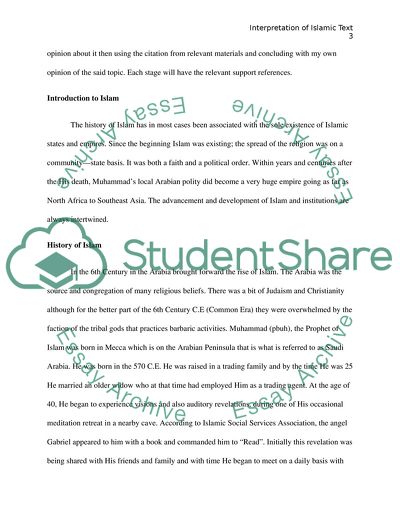Cite this document
(The Interpretation of Islamic Texts Is Entirely Independent of Historical Vicissitudes Term Paper Example | Topics and Well Written Essays - 2750 words - 1, n.d.)
The Interpretation of Islamic Texts Is Entirely Independent of Historical Vicissitudes Term Paper Example | Topics and Well Written Essays - 2750 words - 1. https://studentshare.org/anthropology/1790514-the-interpretation-of-islamic-texts-is-entirely-independent-of-historical-vicissitudes-discuss
The Interpretation of Islamic Texts Is Entirely Independent of Historical Vicissitudes Term Paper Example | Topics and Well Written Essays - 2750 words - 1. https://studentshare.org/anthropology/1790514-the-interpretation-of-islamic-texts-is-entirely-independent-of-historical-vicissitudes-discuss
(The Interpretation of Islamic Texts Is Entirely Independent of Historical Vicissitudes Term Paper Example | Topics and Well Written Essays - 2750 Words - 1)
The Interpretation of Islamic Texts Is Entirely Independent of Historical Vicissitudes Term Paper Example | Topics and Well Written Essays - 2750 Words - 1. https://studentshare.org/anthropology/1790514-the-interpretation-of-islamic-texts-is-entirely-independent-of-historical-vicissitudes-discuss.
The Interpretation of Islamic Texts Is Entirely Independent of Historical Vicissitudes Term Paper Example | Topics and Well Written Essays - 2750 Words - 1. https://studentshare.org/anthropology/1790514-the-interpretation-of-islamic-texts-is-entirely-independent-of-historical-vicissitudes-discuss.
“The Interpretation of Islamic Texts Is Entirely Independent of Historical Vicissitudes Term Paper Example | Topics and Well Written Essays - 2750 Words - 1”. https://studentshare.org/anthropology/1790514-the-interpretation-of-islamic-texts-is-entirely-independent-of-historical-vicissitudes-discuss.


